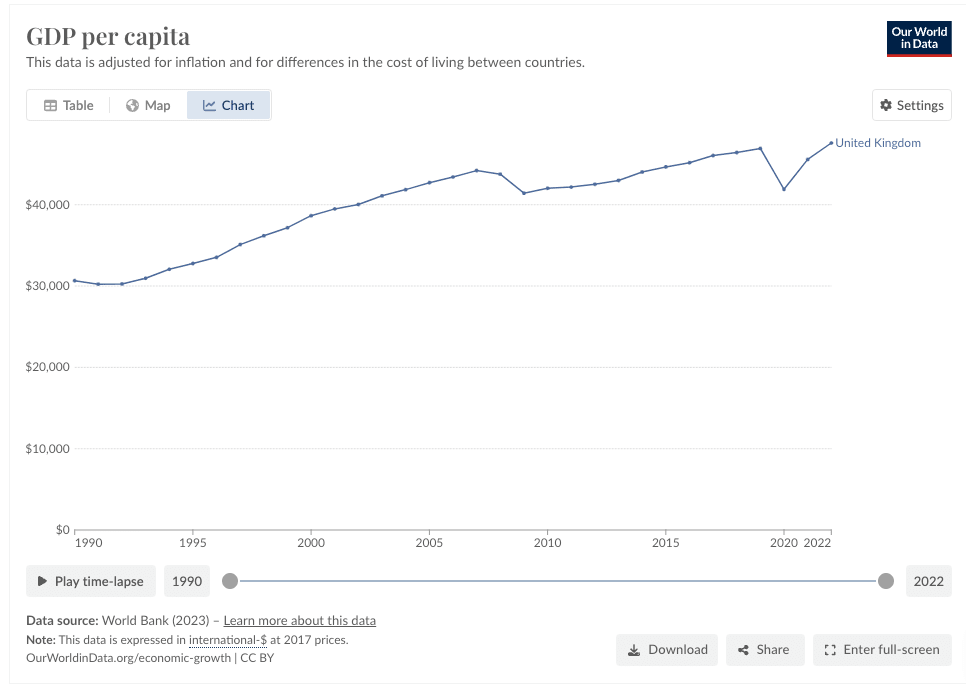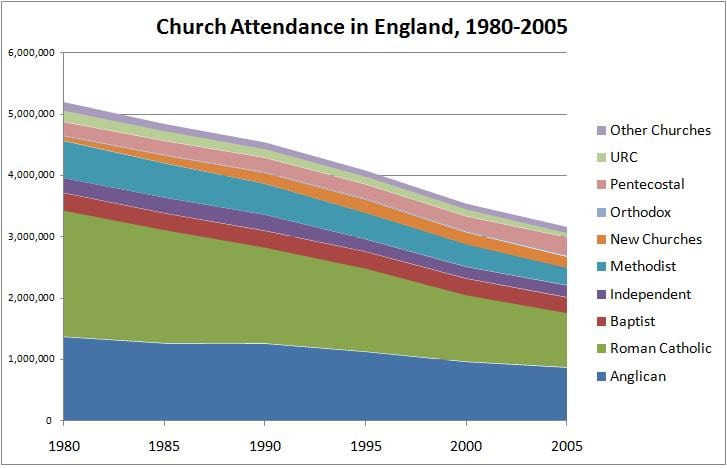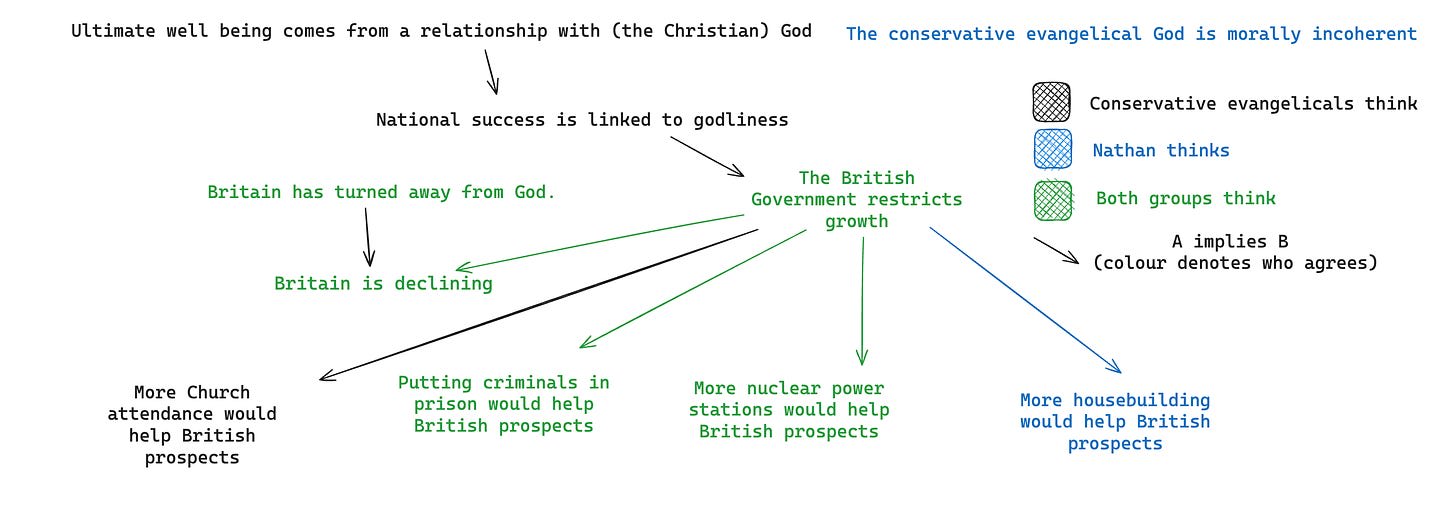A car journey with conservative evangelicals - Understanding some British political-religious beliefs
post by Nathan Young · 2024-12-06T11:22:45.563Z · LW · GW · 8 commentsThis is a link post for https://nathanpmyoung.substack.com/p/the-british-conservative-evangelical
Contents
A sketch of an discussion Why do conservative evangelicals believe this? Let’s take a breath Listening here is hard Okay, what do I think Synthesis Conclusion None 8 comments
I’m heading home from a family wedding this weekend. I had a plane ticket, but in the end, decided to travel back with two of my uncles and my cousin. Most of my dad’s family are evangelicals, my aunts and uncles are children of missionaries or missionaries themselves. And as a family we like to have debates.

Here is a rough sketch of a discussion with my relatives. Though it could as well be one with a chunk1 of my Christian friends. I’m gonna call them “conservative evangelicals”, i.e. an evangelical who takes the Bible literally and has a range of conservative social positions.
To help you track the flow of the discussion, I think there are 4 key arguments here:
- Britain2 is declining
- Britain, specifically, has turned away from (the Christian) God
- National success is linked to godliness
- Ultimate well being comes from a relationship with God
See if you can spot them in the discussion that follows.
A sketch of an discussion
Me: “Who would you vote for?”
Conservative evangelical: “Reform3, probably. Obviously not Labour and you can’t trust the Tories”
Me: “Yeah, fair enough. The Tories have made a mess, can’t take them seriously.”
Conservative evangelical: “It’s terrible. High taxation, high immigration, woke stuff. Not sure I’ll ever vote Tory again”.
Me: “So what do you want Reform to do?”
Conservative evangelical: “Get control of the borders, for a start. Stop this climate rubbish. We need a shakeup of government in general. It’s impossible to run a business here”
Me: “So like, build more housing? Get growth?”
Conservative evangelical: “Not sure I want more housing, too many people here as it is. We don’t have enough schools or enough hospitals. Nothing works”
Me: “Okay so we stop illegal immigration, we build more power stations. Would that work?”
Conservative evangelical: “Sure but it isn’t gonna fix the real problem - this country has turned away from God”
Note how we move4 from politics to theology.
Me: And that’s why things are bad?
Conservative evangelical: Yes, people are so anxious, broken families, trans stuff. It’s God’s judgement on us.
Me: Hmmm okay. And if people turned back to God, the country would be better off?
Conservative evangelical: Yes. People have become so individualistic. They don’t want to have kids, they have no pride in their nation. Multiculturalism means we can’t be proud to be British, but prison chaplains are scared of going to certain cells because muslims control the prisons5. In the end it’s Islam that’s gonna win out.
Me: So why don’t people turn to Christianity if it’s what would be better for them?
Conservative evangelical: Just because it’s better doesn’t mean it’s easy. Wouldn’t I prefer to sit on the sofa rather than go to work each day? People want sin. They want affairs and drugs. So the country is like this.
End.
Why do conservative evangelicals believe this?
So again, to me there are 4 main arguments here, which I will give evidence and counter evidence for, according to the conservative evangelical Chrisitian worldview. I will critique them at the end, but that isn’t really the point of this article. I’ve put the evidence someone might reference along with each claim.
- Britain is declining
Evidence: Economic stagnation, rising rates of mental illness and anxiety, loss of national identity, weakening family structures, increasing LGBT+ behavior.
- Britain has turned away from (the Christian) God.
Evidence: LGBT+ behaviours. Individualism. Decline of the family. Church breakdown. Rise of atheism.
- National success is linked to godliness
Evidence: Success of protestant nations, wider historical references (Europe, British Empire) and theological ones (Biblical Israel suffers when it turns from God6).
- Ultimate well being comes from a relationship with God
(e.g. that People have turned from God and will suffer eternal punishment. Jesus died to cover that cost and if people turn to him they will spend eternity in Heaven.)
Evidence: Individual testimony. The Bible. Weakness of other explanations. Gospel accounts.
Let’s take a breath
I think that it’s worth spending a moment here. We started talking about UK politics and quickly ended up thinking about personal salvation. What happened?
There is a thing that needs to be explained - why the UK is struggling.
Conservative evangelicals, with reference to broad theology and their own experiences have an answer to this question. Just as individuals are selfish and turn away from (the Christian) God, so can nations. And as individuals suffer, so will Nations.

This is a core part of the argument to them. This is the main bit to get. There are some people (.1-5% of the UK population) who actually believe this and it affects who they want to elect and how they want to live..
Listening here is hard
I think being open to what people actually believe is a bit scary. I have to remember their arguments and worse, they might somehow be right.
If I can dismiss conservative evangelicals as racist or homophobic7, I don’t have to learn their reasons and certainly I don’t have to engage with them.
Personally I would advise not worrying if conservative evangelicals are right and just learning the stories they tell themselves. It’s an interesting story!
A difficult part of this is that these people really are competent debaters on matters of faith. I would not recommend trying to out argue them on that topic. And so it feels risky to me to allow theological arguments to be admissible in political discussion. I am scared that I will lose.
I think this kind of fear-based argumentation has generally been unhelpful to me in the search for truth and understanding. I wouldn’t recommend it. These days I would recommend being in a relaxed space, with a notepad and an ability to stop the discussion, then actually trying to understand someone. I don’t need to fear finding out information because what is true is already so8.
But if you actually want to have the discussion, here are my thoughts.
Okay, what do I think
- Britain is in decline
Fair enough. I could nitpick, but that Britain is stagnating seems true. Conservative evangelicals aren’t remotely strange in thinking that the country is in decline. And dire straits for the UK are visible in a lot of data. For instance, British GDP growth per person has nearly flatlined since 2005. The country does seem both worse to live in and generally more lacking in self-belief than the US (though again, note that the difference between decline and stagnation - I think they are too pessimistic).

Source: https://ourworldindata.org/grapher/gdp-per-capita-worldbank?tab=chart&country=~GBR
I think the castigation of gay9 behaviour is circular10, but people do seem more anxious, number of children is down, etc.
But slowing economic growth is real and bad. So yeah, fair point.
2. Britain has turned away from God.
This seems fair too. Britain is far less religious and now engages in more non-Christian behaviours according to conservative evangelicals (and most non-liberal Christians).

All the graphs look like this.
3. National success is linked to godliness
I doubt this is true, but mostly I doubt Christians have any kind of robust argument for it. Where is a big table of countries and godliness? Has someone done an economic study of how Christianity correlates with wealth11? Where does China fit into this picture12? Or recent US growth despite declining religiosity.
I generally see a correlation between the amount someone cares about an argument and the amount of evidence that they can produce for it. My sense is that whilst Christians tend to care deeply about the historicity of the gospels and know their stuff about it, they don’t really care about the sociology/economics of how godliness relates to wealth. I expect if I discuss this with someone there is gonna be some hand waving about Protestant wealth, but no numbers.
So yeah, I don’t expect this to change anyone’s minds. I don’t think that conservative evangelicals think this because of some deep economic intuition. I think they think it because the Bible says it and it is clearly analogous to their personal experience. So onto the next point.
4. Ultimate well being comes from a relationship with God
We are now firmly into theological territory. This is the Gospel. That humanity sinned, God is perfect and can’t stand that and so He sent Jesus to die so that this situation could be resolved.
I don’t believe this - I am not a Christian. But it is worth noting how alive this is to them13.
Conservative evangelical Christians spend an unbelievable amount of time focused on God: Church services and small groups, teaching their kids, praying alone and with friends. When I was a Christian I prayed 10s of times a day, asking God for wisdom or to help the person I was talking to. If a zealous Christian of any stripe is comfortable around me they talk about God all the time.
And yet I don’t think it’s true. How can something be so alive and real to one person and so flawed and sour to another? To these Christians the narrative of God’s salvation is the best story there is. It ties together all other stories. It is behind practically every conversation.
Again, I think it’s worth dwelling on this point. Imagine there is a symphony you cannot hear and a city you cannot see. That the world is full of magic and that every surface is covered with angelic script crying out that one day this place will be restored. Of course that has implications for British politics!
But either one should be willing to listen to this story, or have the honesty to say “ahh that’s where we disagree, I’m not looking to have this discussion right now”
Synthesis

Here is an attempt at turning all this into a single chart
Things we agree on:
- Britain14 is declining,
- The British Government (somehow) stands in the way of growth
- Britain has become less religiously observant over time
- Crime is bad, and Britain would be better off if it were reduced
- More nuclear power stations would be good
Things we disagree on:
- Whether ultimate well being comes from a relationship with the Christian God
- Whether national success is linked to godliness
- Whether more church attendance (or some proxy of godliness) would help British prospects
- Whether more housebuilding would help British prospects
Is this a helpful way to lay it all out?
Conclusion
There isn’t a conclusion. This isn’t that kind of article. It’s an attempt to explain what some actual people think. If you are to take one thing from this it is that real people actually think British decline is linked to actual British people’s relationship with an all powerful deity. And this has all sorts of implications for how they live their lives, what policies they will support and who they will vote for.
Also, where possible, I recommend ditching a flight for a long car journey with your family.
Thanks to Josh Hart and Tim Coysh for reading a draft.
8 comments
Comments sorted by top scores.
comment by Viliam · 2024-12-07T16:17:16.897Z · LW(p) · GW(p)
I would steelman "a [collective] relationship with the Christian God" as something like:
- people feel like they are a part of a community
- (there is a formal hierarchy, but informal) status competitions are frowned upon
- the community endorses things like "be nice to each other" and "help the poor" (in the sense of doing charity, not yelling at those who are not poor and taking their stuff by force)
- the community clearly opposes certain criminal behaviors, such as theft or interpersonal violence
- and all of this is common knowledge (as opposed to most people just privately being nice and opposing violence, but not being sure whether their neighbors do the same)
These generally seem like things that help individual well-being, and probably increase productivity because people need to spend less resources defending against each other.
As opposed to a situation where:
- many people feel lonely
- they waste a lot of time and resources in zero-sum status competitions that most of them lose
- the default way of (online) communication is yelling at each other
- people feel that they are economically threatened and no one cares; the poor because they feel ignored, the non-poor because they expect that others will try to take away stuff from them
- you feel helpless to stop all kinds of social dysfunction that happens all around you
- coordination seems almost impossible
...which is basically the modern way of life for most people. Unless you build your own community, but that is often just a small bubble in a larger dysfunctional sea.
Replies from: Nathan Young↑ comment by Nathan Young · 2024-12-08T11:23:17.725Z · LW(p) · GW(p)
Sure but then those things aren't due to an actual relationship with an actual God, they are for the reasons you state. Which is really really importantly different.
Replies from: Viliam↑ comment by Viliam · 2024-12-08T14:24:53.402Z · LW(p) · GW(p)
Maybe different for us, but not necessarily for them. If you are an atheist, you see religious claims as epiphenomenal, unrelated to the actual things that happen (which may include the social effects of the organized religion). You have a clear line between things that exist and things that don't, and the latter includes all the claims of supernatural. But this "religion kinda works, but for reasons completely unrelated to their claims about the supernatural" is inherently an atheist perspective.
For a religious person, sometimes things actually happen as a result of God's influence. People in a religious group don't feel lonely, because it is the Holy Spirit acting in them, or whatever. People don't waste resources on zero-sum status competition, because God doesn't want his people to do that. People are nice to each other, help each other, prevent social dysfunctions, etc. because this is what Jesus told them to do. And the fact that they can coordinate on large scale and keep the coordination going for millennia is evidence of the special relation God has with His church.
You could try to explain that people naturally don't feel lonely when they become members of the group, but I assume the response would be something like "yes, that is a part of the reason, but the other, more important part is the Holy Spirit". They might give you specific examples of some small religious groups that survived various adversities, and examples of secular clubs that quickly fell apart (and yes, from our perspective this would be selection bias), as evidence that your explanation is not sufficient.
So they would probably be like: yes, communities are good, even if they are not religious; also nonbelievers can be nice to each other, etc., but... why do it the complicated and unreliable way, if you could simply ask God for guidance and receive tons of supernatural help? You are just stubborn and you refuse to accept the overwhelming evidence that your strategy simply does not work.
tl;dr - if you assume that God is epiphenomenal, you are modelling religious people incorrectly
comment by Nathan Young · 2024-12-06T11:25:19.178Z · LW(p) · GW(p)
I find it pretty tiring to add all the footnotes in. If the post gets 50 karma or this gets 20 karma, I probably will.
@Ben Pace [LW · GW] do you folks have some kind of substack upload tool. I know you upload Katja's stuff. If there were a thing I could put a substack address into and get footnotes properly, that would be great.
comment by Anders Lindström (anders-lindstroem) · 2024-12-08T12:00:08.042Z · LW(p) · GW(p)
"Conservative evangelical Christians spend an unbelievable amount of time focused on God: Church services and small groups, teaching their kids, praying alone and with friends. When I was a Christian I prayed 10s of times a day, asking God for wisdom or to help the person I was talking to. If a zealous Christian of any stripe is comfortable around me they talk about God all the time."
Isn't this true for ALL true believers regardless of conviction? I could easily replace 'Conservative evangelical Christians and God' with 'Foodies and food', 'Teenage girls and influencers', 'Rationalists and logic', 'Gym bros and grams of protein per kg/lb of body mass'. There seems to be something inherent in the will to preach to others out of good will, that we want to share something that we believe would benefit others. The road to hell isn't paved with good intentions for nothing...
Replies from: Nathan Young↑ comment by Nathan Young · 2024-12-08T12:08:28.277Z · LW(p) · GW(p)
I am not sure most foodies are thinking about food with every new person. Maybe hardcore foodies?
Replies from: anders-lindstroem↑ comment by Anders Lindström (anders-lindstroem) · 2024-12-08T14:08:00.410Z · LW(p) · GW(p)
My experience says otherwise, but it might have happen to stumble on some militant foodies.
comment by Mateusz Bagiński (mateusz-baginski) · 2025-01-01T12:13:05.804Z · LW(p) · GW(p)
Where does China fit into this picture
Unlike the West, China enjoys unconditional love from the Heavens. /j